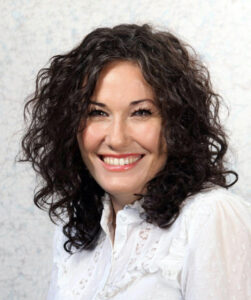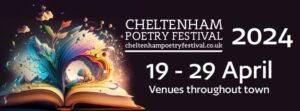Keen to develop your writing and stagecraft? Ink Sweat & Tears asks three top poets to share some tips
by Tim Relf
Finding time to write is a big hurdle for most people, says Holly Winter-Hughes.

photo credit: Gerard Winter-Hughes
‘I used to have a romantic notion that my best material had to be handwritten, but with the demands of life, in reality I edit most of my poetry on my phone,’ says Holly, the founding director of The Word Association, which provides performance and publishing opportunities to those at the fringes of society.
‘Rather than wasting time mindlessly scrolling, I can chip away at my poems whenever I get a spare minute. It opens up a surprising amount of time.’
‘Since I was very young, I’ve written to get stuff out of my head. Sometimes I write from the place of the loudest emotion. A line or image comes to me and I have to follow it.’
Using such lines, images, objects or other people’s poetry as a ‘jumping-off point’ can unexpectedly draw up topics and issues you didn’t necessarily know you needed to write about, suggests Holly. ‘Our bodies hold trauma, and the physicality of writing and performing can help release it.’
Attending spoken word events can be a great way to develop your craft, she adds. ‘They’re such welcoming, accepting places. Go along and listen then, if you’re feeling brave, sign up to the open mic.’
Try not to imitate anyone else if you do get on stage, as the best approach is to just sound like yourself, advises Holly. ‘So many people fall into performing their work in a worn-out style of phrasing. Find your own way of saying things. Also, don’t rush, don’t throw your words away. Your story is worth hearing. Let the words sink in, give your story space to breathe.’
‘Ultimately, you have to write for yourself, so don’t try to predict what an audience will enjoy. Write what you need to write and the right audience will find you.’
‘Reading everything you can get your hands on will give you a whole host of tools to help solve any tricky spots you encounter in your own poetry,’ she adds. ‘You’ll also find the permission to write about the hardest subjects and the most mundane. The more you read and the more you write, the louder your own distinct voice will become.’
There is no better training for writing than to read, agrees Rishi Dastidar, whose most recent collection, Neptune’s Project, was published by Nine Arches Press last year.

photo credit: Naomi Woddis
‘It’s the quickest way to discover language at play, new ideas and ways of seeing the world, and to be thrilled by the sensation of seeing a mind put itself across via page and screen,’ he says.
‘Don’t worry that reading lots might mean you won’t sound like you. The reverse will happen. You’ll discover who you want to emulate, who you want to ignore, who you want to better – and, by doing that, hopefully the unique voice only you can provide will emerge.’
It’s useful, adds Rishi, to keep a notebook and pen with you at all times to record interesting snippets of language you encounter.
‘The Notes app on your phone is also fine for this, but I find writing by hand somehow helps put the language into my body. When it’s in there, the alchemical process starts that connects random fragments into something that can cohere as a poem.’
Once you have a draft, always read it aloud, advises Rishi. ‘Poetry has to work in the air, as well as on the page or the screen. As you read aloud, any places where you stumble or trip are likely indicators of where you can tweak and improve your word and punctation choices.’
‘There is also a magic to putting aside a poem you’ve drafted, and then revisiting it a few days, weeks or months later. Its flaws – and the fixes you need to make – will be much easier to spot then.’

photo credit: Isabel Galleymore
When it comes to editing, it can help to loosen your definitions of what is ‘meaningful’, ‘beautiful’ or ‘poignant’, suggests Isabel Galleymore, whose second collection, Baby Schema, is published by Carcanet.
‘Write what you’re moved by – however insignificant or unsettling it may be,’ she says. ‘The best advice I ever received was to start writing the thing that excites you most because, well, why wouldn’t you?’
Isabel says a phrase will sometimes enter her mind, prompting others to accumulate around it. In other cases, she might be struck by a certain object or animal, and it will be a metaphor that materialises and tells her it wants to be a poem.
‘Most of the time, these moments are very unpoetic, but contain something strange. I’ll be gardening and lift up a plant pot to find a crowd of squiggling invertebrates, or, coming home, I’ll notice a moon-eyed stuffed toy on somebody’s dashboard and wonder why it’s been left behind.’
‘Some poems arrive almost fully formed, but that’s incredibly rare. Others, stashed away in drawers, have taken years. For me it’s often about finding a tool to unlock a poem that I’m otherwise finding stubborn or difficult to develop. Once, after a year-and-a-half of working on a tiny ten-line poem, a friend suggested swapping its ending for its beginning and voila I could finally leave it alone.’

Festival logo design: Jon Tarrant
Holly, Rishi and Isabel are taking part in this year’s Cheltenham Poetry Festival. Rishi will be reading online on 9th April ahead of the in-person events; while Holly and Isabel will be appearing at the Cheltenham Friends Meeting House on April 20. Other leading poets, including Matthew Hollis, Liz Berry and Don Paterson, are also appearing at the Festival.
